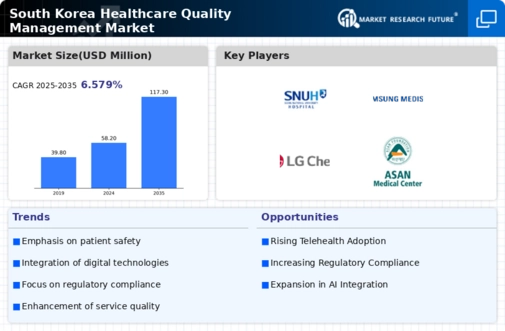The South Korea Healthcare Quality Management Market is becoming increasingly competitive as it adapts to the evolving demands of healthcare providers, patients, and regulatory frameworks. The market has witnessed substantial growth driven by the emphasis on enhancing patient safety, improving care outcomes, and meeting regulatory compliance. As a result, various companies are entering this space with innovative solutions aimed at quality management across healthcare facilities.
This landscape involves an intricate interplay of various organizations, each contributing unique offerings and approaches aimed at optimizing healthcare delivery while adhering to high-quality standards. Companies are leveraging advanced technologies and methodologies, including data analytics, process optimization, and continuous improvement strategies, to gain a competitive edge and ensure excellence in healthcare services.
Hsiri has established itself as a prominent player in the South Korea Healthcare Quality Management Market, focusing on providing tailored solutions that enhance the overall quality of care in healthcare institutions. The company has developed a robust suite of quality management systems that facilitate comprehensive assessments and continuous monitoring of healthcare processes. Hsiri’s strengths lie in its commitment to innovation and adaptability, allowing it to effectively cater to the needs of various healthcare organizations, from hospitals to clinics.
Furthermore, the company places a strong emphasis on customer support, ensuring that its clients receive consistent guidance in implementing quality management frameworks. This dedication to service excellence has solidified Hsiri’s reputation in South Korea, enabling it to secure significant partnerships and collaborations with key stakeholders in the healthcare sector.
CJ Healthcare, another notable entity in the South Korea Healthcare Quality Management Market, has a diverse range of key products and services designed to elevate the standards of healthcare quality. The company specializes in pharmaceuticals and medical devices, which complement its quality management initiatives and ensure that healthcare facilities adhere to stringent compliance and safety regulations. CJ Healthcare benefits from its strong market presence, backed by its extensive distribution network and partnerships with various healthcare providers and institutions in South Korea.
The company's strengths also include a keen focus on research and development, enabling it to innovate continuously and address emerging healthcare challenges. Moreover, CJ Healthcare has pursued strategic mergers and acquisitions to enhance its capabilities and expand its service offerings, further solidifying its position within the competitive landscape of healthcare quality management in the region. Through these efforts, CJ Healthcare aims to empower healthcare organizations in South Korea to deliver superior patient care and achieve lasting improvements in quality management practices.














